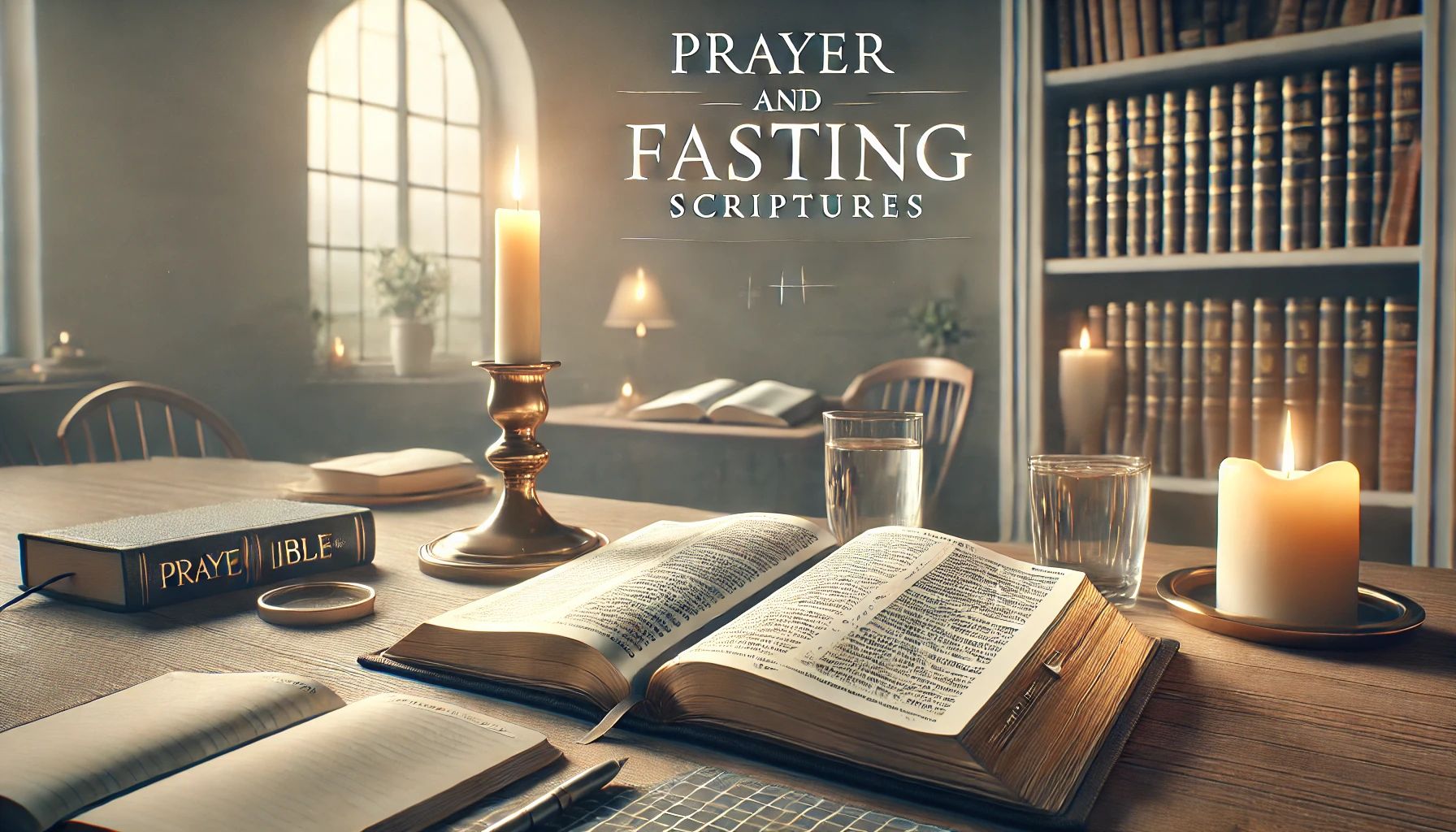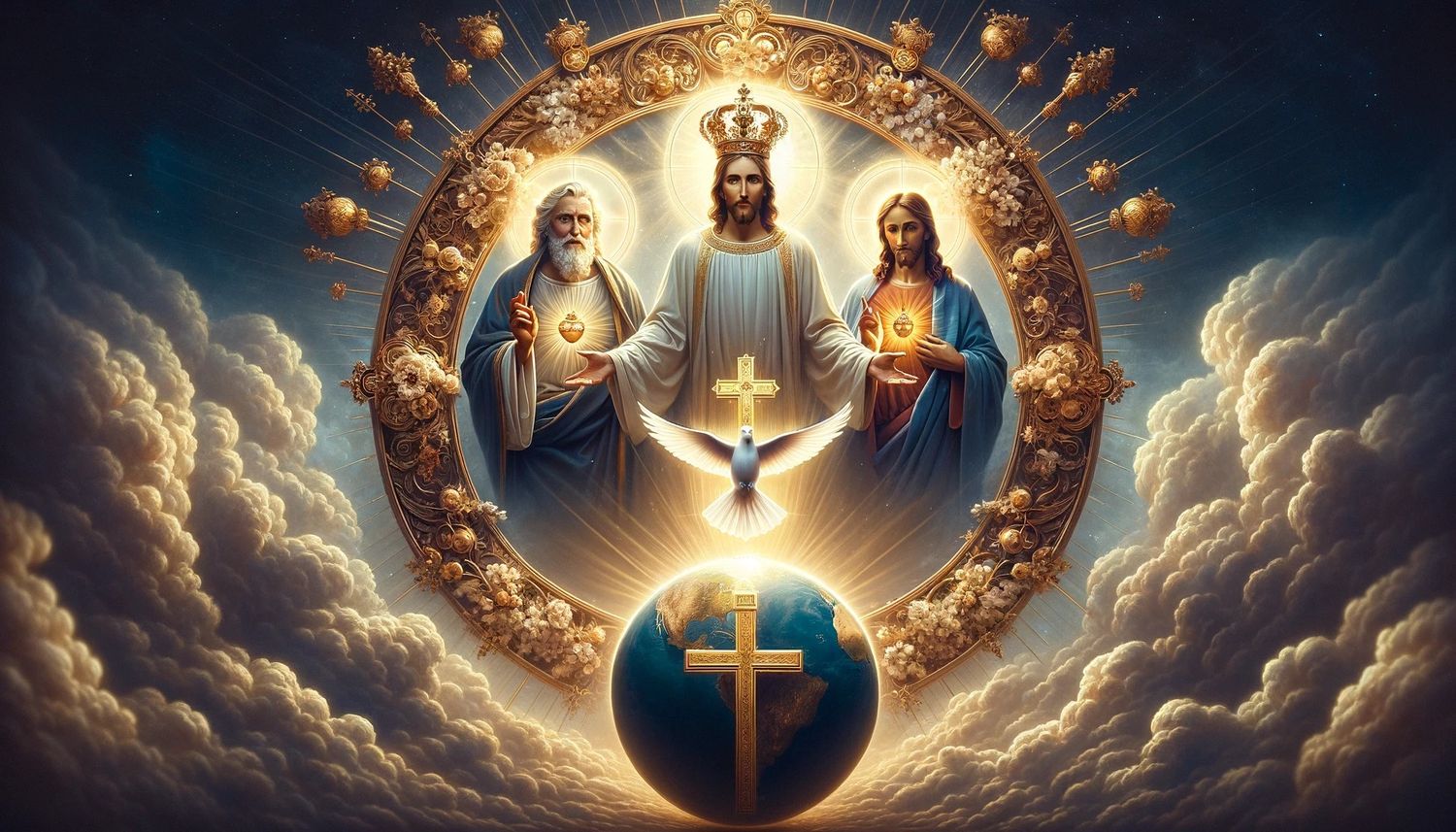Home>Theology and Spirituality>What Is Fasting In Catholicism


Theology and Spirituality
What Is Fasting In Catholicism
Published: February 15, 2024
Jason DeRose, Managing Editor at Christian.net, uses his expertise in religion and journalism to deepen understanding of faith's societal impacts. His editorial leadership, coupled with a strong academic background, enriches the platform’s diverse content, earning him recognition in both journalism and religious circles.
Learn about the significance of fasting in Catholicism and its role in theology and spirituality. Explore the traditions and practices of fasting in the Catholic faith.
(Many of the links in this article redirect to a specific reviewed product. Your purchase of these products through affiliate links helps to generate commission for Christian.net, at no extra cost. Learn more)
Table of Contents
Introduction
Fasting holds a significant place in the practice of Catholicism, serving as a spiritual discipline that has been observed for centuries. It is a practice deeply rooted in the faith and is regarded as a means of drawing closer to God through self-denial and spiritual reflection. The act of fasting in Catholicism extends beyond a mere physical abstinence from food; it encompasses a profound spiritual journey that fosters a deeper connection with one's faith and a greater understanding of the teachings of the Church.
Throughout history, fasting has been intertwined with the spiritual fabric of Catholicism, playing a pivotal role in the lives of believers. It is a practice that transcends cultural and geographical boundaries, uniting Catholics worldwide in a shared commitment to spiritual growth and self-discipline. As such, understanding the history, purpose, rules, and spiritual significance of fasting in Catholicism is essential for appreciating its profound impact on the faithful and the Church as a whole.
In the following sections, we will delve into the rich history of fasting in Catholicism, explore its purpose and spiritual benefits, examine the rules and guidelines governing this practice, and address common misconceptions. By doing so, we aim to illuminate the profound significance of fasting within the Catholic tradition and provide insight into its transformative power in the lives of believers.
Read more: What To Eat During Lent Fasting?
The History of Fasting in Catholicism
Fasting has been an integral part of the Catholic tradition since the early days of the Church. Its roots can be traced back to the teachings of Jesus Christ and the practices of the early Christian communities. In the New Testament, fasting is depicted as a spiritual discipline that holds profound significance in the life of a believer. The Gospel of Matthew recounts Jesus' forty-day fast in the wilderness, setting a powerful example of the importance of self-denial and spiritual discipline.
The early Christians, deeply influenced by the teachings of Jesus and the apostles, embraced fasting as a means of deepening their spiritual connection with God. Fasting was not only seen as a form of self-discipline but also as a way to express repentance, seek guidance, and demonstrate solidarity with those in need. As the early Church expanded and developed its liturgical practices, fasting became an established tradition, with specific days and seasons set aside for abstinence and self-denial.
Over time, the Church Fathers, such as St. Augustine and St. Thomas Aquinas, further articulated the spiritual significance of fasting, emphasizing its role in purifying the soul and strengthening one's resolve in the face of temptation. Fasting was integrated into the Church's liturgical calendar, with designated fasting days during Lent, Advent, and other penitential seasons.
During the Middle Ages, fasting took on additional layers of significance within the monastic communities. Monks and nuns embraced rigorous fasting practices as a way to cultivate spiritual discipline and draw closer to God. Fasting was viewed as a path to spiritual enlightenment and a means of participating in the suffering of Christ.
The history of fasting in Catholicism also reflects cultural and regional variations in the observance of this spiritual discipline. Different traditions and customs emerged, shaping the ways in which fasting was practiced and understood within diverse communities of believers.
Today, the history of fasting in Catholicism continues to inform the Church's approach to spiritual discipline and self-denial. While the specific practices and guidelines may have evolved, the foundational principles of fasting as a transformative spiritual practice remain deeply rooted in the rich tapestry of Catholic tradition.
The Purpose of Fasting in Catholicism
Fasting in Catholicism serves a multifaceted purpose that extends beyond the mere act of abstaining from food. At its core, fasting is a spiritual discipline designed to foster a deeper connection with God and cultivate virtues essential to the Christian life. The purpose of fasting in Catholicism can be elucidated through several key facets:
1. Spiritual Discipline and Self-Denial
Fasting serves as a tangible expression of self-discipline and self-denial, aligning with the teachings of Jesus Christ. By voluntarily forgoing certain comforts, particularly in the form of food, Catholics engage in a practice that challenges their physical desires and redirects their focus towards spiritual nourishment. This act of self-denial is rooted in the belief that by subduing the desires of the flesh, individuals can elevate their spiritual awareness and draw closer to God.
2. Repentance and Conversion
Fasting holds a penitential significance within Catholicism, providing a means for believers to express contrition for their sins and seek God's mercy. It is a time of introspection and repentance, during which individuals are called to examine their lives, acknowledge their shortcomings, and turn towards a path of conversion. Through fasting, Catholics seek purification of heart and a renewed commitment to living in accordance with the teachings of Christ.
Read more: What Religions Fast During Lent
3. Solidarity and Compassion
In embracing the practice of fasting, Catholics express solidarity with those who suffer from hunger and deprivation. By experiencing a degree of physical hunger through fasting, believers are reminded of the plight of the less fortunate and are called to respond with compassion and generosity. Fasting becomes a catalyst for charitable action, prompting individuals to extend support to those in need and advocate for justice and equity in society.
4. Spiritual Vigilance and Discernment
Fasting heightens spiritual vigilance and fosters a spirit of discernment, enabling individuals to attune themselves to the promptings of the Holy Spirit. By quieting the clamor of worldly distractions, fasting creates a space for prayer, meditation, and contemplation. This heightened spiritual awareness allows Catholics to discern God's will more clearly and seek guidance in their personal and communal lives.
5. Cultivation of Virtues
Through the practice of fasting, Catholics strive to cultivate virtues such as humility, temperance, and perseverance. By exercising restraint in the consumption of food, individuals develop a greater sense of moderation and self-control. This, in turn, nurtures virtues that are essential for leading a Christ-centered life and embodying the values of the Gospel.
In essence, the purpose of fasting in Catholicism encompasses a profound journey of self-discovery, spiritual renewal, and communal solidarity. It is a transformative practice that transcends the physical realm, inviting believers to embark on a profound inward journey towards spiritual growth and deeper communion with God.
The Rules and Guidelines for Fasting in Catholicism
Fasting in Catholicism is governed by specific rules and guidelines that outline the expectations and practices to be observed by the faithful. These regulations are designed to provide a framework for the spiritual discipline of fasting while accommodating the diverse needs and circumstances of individuals. The rules and guidelines for fasting in Catholicism can be elucidated through the following key principles:
-
Days of Fasting: The Catholic Church designates certain days and seasons for fasting, with the most prominent being Ash Wednesday and Good Friday. On these days, Catholics between the ages of 18 and 59 are called to observe a fast, which traditionally involves consuming only one full meal and two smaller meals that, when combined, do not equal the size of the full meal. Additionally, Catholics are called to abstain from meat on Ash Wednesday, Good Friday, and all Fridays during Lent.
-
Penitential Seasons: Fasting is particularly emphasized during the penitential seasons of Lent and Advent. Lent, the forty-day period leading up to Easter, holds special significance for fasting and abstinence. Catholics are encouraged to engage in acts of self-denial and fasting as a means of preparing their hearts and minds for the celebration of Christ's resurrection. Similarly, Advent, the season preceding Christmas, invites believers to embrace fasting as a way of cultivating a spirit of anticipation and spiritual readiness for the birth of Christ.
-
Personal Discretion and Health Considerations: While the Church provides clear guidelines for fasting, it also recognizes the importance of individual circumstances and health considerations. Those who are unable to fast due to health reasons or other legitimate concerns are encouraged to engage in alternative forms of self-denial or acts of charity. The overarching principle is that fasting should be approached with a spirit of reverence and discernment, taking into account one's physical well-being and personal limitations.
-
Spirit of Sacrifice and Prayer: Beyond the specific regulations, the spirit of fasting in Catholicism is rooted in the principles of sacrifice and prayer. Fasting is not merely a matter of adhering to dietary restrictions; it is a profound act of devotion that is accompanied by prayer, almsgiving, and a genuine desire for spiritual renewal. The focus is on the interior disposition of the heart, where fasting becomes a means of deepening one's relationship with God and embracing the sacrificial love exemplified by Jesus Christ.
In essence, the rules and guidelines for fasting in Catholicism serve as a framework for the faithful to engage in this spiritual discipline with reverence, intentionality, and a spirit of communal solidarity. By adhering to these principles, Catholics are invited to embrace fasting as a transformative practice that nurtures their spiritual journey and strengthens their connection to the rich traditions of the Church.
Read more: How To Fast For Advent
The Different Types of Fasting in Catholicism
Fasting in Catholicism encompasses various forms and expressions, each carrying its own spiritual significance and observance within the faith. These different types of fasting serve as avenues for believers to engage in self-denial, spiritual discipline, and acts of devotion. Understanding the diverse manifestations of fasting within the Catholic tradition provides insight into the multifaceted nature of this spiritual practice.
-
Abstaining from Food: The most commonly recognized form of fasting in Catholicism involves abstaining from certain types of food or reducing the quantity of meals consumed. This can range from refraining from meat on designated days, such as Fridays during Lent, to observing a strict fast on Ash Wednesday and Good Friday, where only one full meal and two smaller meals are permitted.
-
Fasting from Luxuries and Comforts: Beyond food, Catholics may engage in fasting by voluntarily abstaining from luxuries and comforts that hold significance in their lives. This could include refraining from entertainment, social media, or other indulgences as a means of redirecting their focus towards spiritual reflection and prayer.
-
Fasting of the Senses: Some traditions within Catholicism emphasize fasting of the senses, wherein believers seek to discipline not only their dietary habits but also their sensory experiences. This may involve reducing exposure to sensory stimuli, practicing silence, or engaging in acts of simplicity to heighten spiritual awareness.
-
Fasting through Acts of Charity: In a broader sense, fasting in Catholicism extends to acts of charity and service to others. Believers may fast from selfishness and self-centeredness by actively engaging in acts of compassion, generosity, and social justice. This form of fasting emphasizes the transformative power of selflessness and love for one's neighbor.
-
Fasting of the Heart: At its essence, fasting in Catholicism transcends external observances and calls for a fasting of the heart. This inner fasting involves cultivating virtues, such as humility, patience, and forgiveness, while purifying one's intentions and aligning one's desires with the will of God.
These diverse types of fasting in Catholicism reflect the richness and depth of the spiritual discipline within the faith. Each form of fasting offers believers an opportunity to engage in self-examination, spiritual growth, and a deepening of their relationship with God. By embracing these varied expressions of fasting, Catholics are invited to embark on a holistic journey of self-discovery, transformation, and communion with the divine.
The Spiritual Benefits of Fasting in Catholicism
Fasting in Catholicism yields profound spiritual benefits that resonate deeply with the faithful, shaping their inner lives and fostering a transformative connection with God. These spiritual benefits extend beyond the physical act of abstaining from food and encompass a holistic journey of self-discovery, renewal, and communion with the divine.
1. Deepened Spiritual Awareness
Fasting serves as a catalyst for heightened spiritual awareness, creating a sacred space for introspection, prayer, and contemplation. By quieting the clamor of worldly distractions, individuals embarking on a fast are able to attune themselves to the promptings of the Holy Spirit. This heightened spiritual sensitivity enables Catholics to discern God's presence more acutely and seek clarity in their spiritual journey.
2. Strengthened Discipleship
Through the practice of fasting, Catholics are invited to embody the virtues of self-discipline, temperance, and perseverance. By exercising restraint in the consumption of food, believers cultivate a greater sense of self-control and resilience, mirroring the steadfastness exemplified by Jesus Christ. This strengthening of discipleship empowers individuals to navigate life's challenges with unwavering faith and fortitude.
Read more: What Are The Rules Of Fasting During Lent
3. Enhanced Compassion and Solidarity
Fasting engenders a profound sense of solidarity with those who suffer, prompting believers to respond with compassion and empathy. By experiencing a degree of physical hunger through fasting, Catholics are reminded of the plight of the less fortunate and are called to advocate for justice and equity in society. This heightened empathy fosters a spirit of solidarity and compels individuals to actively engage in acts of charity and social justice.
4. Purification of Heart and Intentions
The spiritual discipline of fasting facilitates a process of inner purification, wherein individuals seek to cleanse their hearts and align their intentions with the will of God. By embracing self-denial and repentance, Catholics embark on a journey of spiritual purification, shedding the burdens of selfishness and egoism. This purification of heart enables believers to cultivate virtues such as humility, forgiveness, and selflessness, fostering a deeper resonance with the teachings of Christ.
5. Renewed Spiritual Vitality
Fasting serves as a source of spiritual rejuvenation, infusing believers with a renewed sense of vitality and purpose. As individuals engage in acts of self-denial and prayer, they experience a profound inner renewal, shedding spiritual lethargy and embracing a revitalized commitment to their faith. This renewed spiritual vitality empowers Catholics to approach their relationship with God with renewed fervor and devotion.
In essence, the spiritual benefits of fasting in Catholicism encompass a transformative journey of self-discovery, spiritual renewal, and alignment with the divine. By embracing the profound spiritual rewards of fasting, believers are invited to embark on a deeply enriching path of spiritual growth and communion with God.
Common Misconceptions About Fasting in Catholicism
Misconceptions surrounding fasting in Catholicism often stem from a lack of understanding of the nuanced spiritual and cultural aspects of this practice. Addressing these misconceptions is crucial for fostering a more informed and respectful dialogue about the significance of fasting within the Catholic tradition.
1. Fasting is Solely About Physical Abstinence
One common misconception is that fasting in Catholicism is solely concerned with physical abstinence from food. While the act of refraining from certain foods is a tangible aspect of fasting, its deeper significance lies in the spiritual discipline and self-denial it entails. Fasting is a holistic practice that encompasses prayer, introspection, and acts of charity, serving as a means of nurturing spiritual growth and communion with God.
2. Fasting is Outdated and Irrelevant
Some individuals perceive fasting within Catholicism as an outdated and irrelevant practice in the modern world. However, fasting remains a vibrant and meaningful aspect of the faith, offering believers a pathway to deepen their spiritual awareness and cultivate virtues essential to the Christian life. Far from being obsolete, fasting continues to hold profound significance for Catholics seeking to engage in a transformative journey of self-discovery and spiritual renewal.
3. Fasting Imposes Unreasonable Restrictions
There is a misconception that fasting imposes unreasonable and burdensome restrictions on individuals, leading to a sense of deprivation and discomfort. In reality, the rules and guidelines for fasting in Catholicism are designed to encourage a spirit of reverence, discernment, and communal solidarity. The Church recognizes individual circumstances and health considerations, emphasizing the importance of approaching fasting with a balanced and mindful disposition.
4. Fasting is a Means of Earning Salvation
Another misconception is that fasting is a means of earning salvation or proving one's worthiness before God. In Catholic teaching, salvation is a gift of divine grace, and fasting is not a transactional practice aimed at earning favor with God. Rather, fasting serves as a means of deepening one's relationship with God, expressing contrition, and embracing the sacrificial love exemplified by Jesus Christ.
Read more: How Did The Apostles Fast
5. Fasting is Uniform Across Cultures and Regions
It is important to recognize that fasting practices within Catholicism exhibit cultural and regional variations, reflecting the diverse expressions of faith within the global Church. Different communities may observe fasting in distinct ways, influenced by their cultural traditions and historical contexts. Understanding and respecting this diversity enriches the appreciation of fasting as a universal yet culturally nuanced spiritual practice.
Addressing these misconceptions fosters a more nuanced understanding of the profound spiritual and communal dimensions of fasting within the Catholic tradition. By dispelling misconceptions, a deeper appreciation of the transformative power of fasting can emerge, inviting individuals to engage with this spiritual discipline with reverence, understanding, and a spirit of openness.
Conclusion
In conclusion, fasting in Catholicism stands as a timeless and profound spiritual discipline that transcends mere physical abstinence. Its rich history, deeply rooted in the teachings of Jesus Christ and the early Christian communities, underscores its enduring significance within the faith. The purpose of fasting in Catholicism extends beyond self-denial; it encompasses a transformative journey of spiritual growth, repentance, and solidarity with the marginalized. The rules and guidelines for fasting provide a framework for believers to engage in this practice with reverence and intentionality, while accommodating individual circumstances and health considerations.
The diverse types of fasting within Catholicism reflect the multifaceted nature of this spiritual discipline, offering believers various avenues for self-examination, renewal, and communion with the divine. Moreover, the spiritual benefits of fasting, including heightened spiritual awareness, strengthened discipleship, and enhanced compassion, underscore its profound impact on the inner lives of the faithful. By dispelling common misconceptions, a deeper appreciation of the transformative power of fasting emerges, inviting individuals to engage with this spiritual discipline with reverence, understanding, and a spirit of openness.
Ultimately, fasting in Catholicism serves as a poignant reminder of the enduring values of self-discipline, compassion, and spiritual renewal. It invites believers to embark on a profound inward journey, aligning their hearts and minds with the teachings of Christ and fostering a deeper connection with God. As a practice deeply woven into the fabric of the Catholic tradition, fasting continues to inspire and guide believers on a transformative path of spiritual growth, communal solidarity, and unwavering devotion to the principles of the Gospel.










